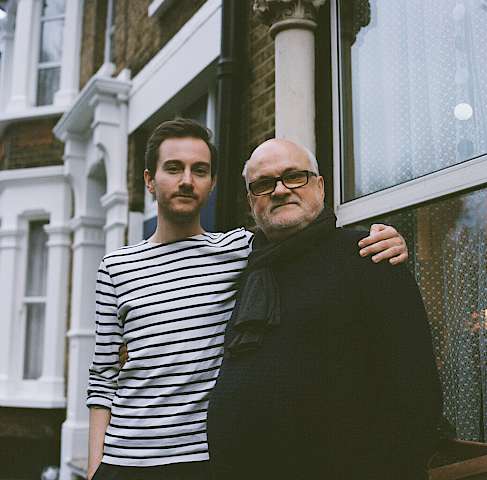John chose to stay at home and look after his baby son Joe in the early 1990s, when you didn’t see many other dads looking after babies. John and Joe talk together about what that decision meant to their relationship.
Ep06: Sad to Give It Up
Transcript:
What sort of things panicked you at the beginning?
John: Health visitors. I was panic stricken. Because there weren’t many dads around in those days, looking after babies. And I remember the first time the health visitor came I was really ultra tidying up and making sure the place was really clean because I was worried she would start questioning why I was at home, and where’s your wife, where’s the child’s mother and all that sort of stuff.
So even as a social worker you worried about the health visitor coming?
Oh yeah. Absolutely. The kind of legitimacy of what I was doing, I think. Very much so.
[music]
John: Hello I’m John Newman, I was born in 1957 and I grew up in Tower Hamlets.
Joe: I’m Joe Newman and I was born in 1989 and I grew up in Newham.
I’m Rosa Schling, I’m a new parent, and I’ve been recording memories of childcare and parenting in London’s East End. This is Holding the Baby, an On the Record podcast.
How did people react to you being at home looking after Joe?
I don’t know really, looking back at it. I think people were surprised, you know. As I say there weren’t that many dads around, now there’s loads of dads looking after babies and looking after young kids and what have you. And grandfathers as well.
And I remember I used to take you to playgroups. I remember we went to one church and all the mums were round in a circle and all the kids were just getting on with it. And of course I’m there, and I’m everybodies dad. You know these kids don’t get the chance to have a man around. And I found that quite oppressive actually.
I remember playing with you a lot, with sticklebricks
Joe: I remember sticklebricks, yeah
John: Dinosaurs. And I remember falling asleep a lot, in the afternoon.
Joe: What, because I’d just tire you out?
John: I guess so, but for a long time you used to have an afternoon nap. I suppose the idea was you had an afternoon nap too. Well, it wasn’t the idea, the idea was you’d get tea ready and do the housework while you were asleep. But often we’d just both fall asleep on the sofa, mum would come in and go, oh there you both are! [laughter]
[music]
John: I grew up in a house where mum did the shopping, the cooking and dad didn’t do much of anything like that unless he had to. But he would always insist on hoovering the house on a Sunday, and mum had been cleaning it all week so, not an easy situation. But we had to leave the house on a Sunday while he hoovered. God knows what that was all about.
But we always had this thing about gender roles, I did the cooking, the ironing what have you. I did take on the house husband role properly and did the shopping and stuff, yeah. I suppose there was a bit of me that kept thinking ‘Oh I should be out at work, I should be doing the manly thing’, but there was also a bit of me that really, really enjoyed it, and I was a bit sad to give it up really.
When did you give it up?
In 1992
Because then Julie went on maternity leave
She went on maternity leave and then we swapped around and I worked full-time and Julie worked part-time.
Okay. What impact do you think it had on you, having those years at home with your dad?
Joe: Maybe there’s a security that I feel as a person, I never really feel anxious about that I’m cared for, or that there are people who care about me. That never feels in doubt.
John: We live in this bizarre situation don’t we, where we want to have a good society where kids are properly parented, yet we put a lot of pressure on particularly single parents, to go out to work and use substitute care. So I think in a perfect world you have a balance. I mean that balance Julie and I had I think was a really good one, in that we both had the opportunity to spend time, quality time with our children, reverse roles and not just play it but really do it, become that person who stayed at home and did the stuff and then the other person went to work. I think that’s healthy. I feel very privileged to have been able to have done that. I am very interested in the fact that men don’t play enough of a role in the parenting of boys particularly and I think that’s had an impact on our society in a lot of very negative ways. I’m not trying to be prescriptive about whether a child needs two parents or whatever, I don’t think that’s the case at all, or whether they need to have a man and a woman necessarily. They just need those basic needs to be met for safety, security, and they need to be encouraged and supported to become themselves. That’s what it’s all about really.
[music and end credits]


